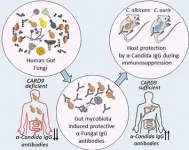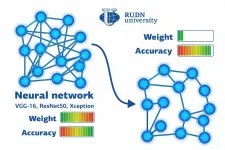(Press-News.org) Washington, DC, February 5, 2021 - A study in the Journal of the American Academy of Child and Adolescent Psychiatry (JAACAP), published by Elsevier, reports that in a diverse, cross-national sample of youth, physical discipline and cognitive deprivation had distinct associations with specific domains of developmental delay. The findings are based on the Multiple Indicator Cluster Surveys, which is an ongoing, international household survey initiative coordinated and assisted by the United Nations agency, UNICEF.
"Physical discipline and cognitive deprivation are well-established risks to child development. However, it is rare that these experiences are examined in relation to each other," said lead author Carmel Salhi, ScD, an Assistant Professor at the Department of Health Sciences, Northeastern University, Boston, MA, USA. "Our study allowed us to explore how these experiences co-occur in childhood internationally and whether they relate to different aspects of child development.
"This is important as recent research in neuroscience suggests that experiences, which provoke fear, have different effects on a child's neurodevelopment than cognitive deprivation."
A sample of 29,792 children between the ages of 3 - 6 years old and their caregivers, across 17 countries completed measures of physical discipline, cognitive deprivation and risk of developmental delay. Factors used to determine physical discipline included spanking or slapping on the arm, hand, or leg. Cognitive deprivation included not counting or reading with a child over the past 3 days and the absence of books in the home.
"To see if this framework has the potential to inform policy and public health interventions, we conducted the first large-scale epidemiological study using this conceptual framework," Dr. Salhi added.
Physical discipline was associated with 50 percent higher odds for risk of socioemotional delay, at least 2.5 times higher than the risk of any of the experiences of cognitive deprivation. Not counting or not reading with the child were associated with 47 percent and 62 percent higher odds, respectively, for risk of cognitive delay. Physical discipline did not confer any risk of cognitive delay.
These findings suggest that the distinction between fear and deprivation in child development, established in clinical neuroscience, is important to public health research and interventions. Furthermore, a large body of evidence links both physical discipline and experiences of cognitive deprivation with poverty and social marginalization. Taken together, this suggests that redistributive policies that alleviate socioeconomic strain can have demonstrably positive effects across a range of child developmental outcomes within a population.
INFORMATION:
Notes for editors
The article is "Physical Discipline, Deprivation, and Differential Risk of Developmental Delay Across 17 Countries," by Carmel Salhi, ScD, Elizabeth Beatriz, PhD, Ryan McBain, ScD, Dana McCoy, PhD, Margaret Sheridan, PhD, Gunther Fink, PhD (https://doi.org/10.1016/j.jaac.2020.02.016). It currently appears on the JAACAP Articles In Press page and will appear in the Journal of the American Academy of Child and Adolescent Psychiatry, volume 60, issue 2 (February 2021), published by Elsevier.
Copies of this paper are available to credentialed journalists upon request; please contact the JAACAP Editorial Office at support@jaacap.org or +1 202 587 9674. Journalists wishing to interview the authors may contact Carmel Salhi atc.salhi@northeastern.edu.
About JAACAP
Journal of the American Academy of Child and Adolescent Psychiatry (JAACAP) is the official publication of the American Academy of Child and Adolescent Psychiatry. JAACAP is the leading journal focusing exclusively on today's psychiatric research and treatment of the child and adolescent. Published twelve times per year, each issue is committed to its mission of advancing the science of pediatric mental health and promoting the care of youth and their families.
The Journal's purpose is to advance research, clinical practice, and theory in child and adolescent psychiatry. It is interested in manuscripts from diverse viewpoints, including genetic, epidemiological, neurobiological, cognitive, behavioral, psychodynamic, social, cultural, and economic. Studies of diagnostic reliability and validity, psychotherapeutic and psychopharmacological treatment efficacy, and mental health services effectiveness are encouraged. The Journal also seeks to promote the well-being of children and families by publishing scholarly papers on such subjects as health policy, legislation, advocacy, culture and society, and service provision as they pertain to the mental health of children and families.
About Elsevier
As a global leader in information and analytics, Elsevier helps researchers and healthcare professionals advance science and improve health outcomes for the benefit of society. We do this by facilitating insights and critical decision-making for customers across the global research and health ecosystems.
In everything we publish, we uphold the highest standards of quality and integrity. We bring that same rigor to our information analytics solutions for researchers, health professionals, institutions and funders.
Elsevier employs 8,100 people worldwide. We have supported the work of our research and health partners for more than 140 years. Growing from our roots in publishing, we offer knowledge and valuable analytics that help our users make breakthroughs and drive societal progress. Digital solutions such as ScienceDirect, Scopus, SciVal, ClinicalKey and Sherpath support strategic research management, R&D performance, clinical decision support, and health education. Researchers and healthcare professionals rely on our 2,500+ digitized journals, including The Lancet and Cell, our 40,000 eBook titles; and our iconic reference works, such as Gray's Anatomy. With the Elsevier Foundation and our external Inclusion & Diversity Advisory Board, we work in partnership with diverse stakeholders to advance inclusion and diversity in science, research and healthcare in developing countries and around the world.
Elsevier is part of RELX, a global provider of information-based analytics and decision tools for professional and business customers. http://www.elsevier.com
Media contact
JAACAP Editorial Office
+1 202 587 9674
support@jaacap.org
UNIVERSITY PARK, Pa.-- When actor Tom Hanks announced his COVID-19 diagnosis on March 11, 2020, many Americans were still learning about the virus and its severity. According to new research, Hanks' announcement may have affected how some people understood the virus and their behavior toward its prevention.
The day after Hanks posted the news on social media, Jessica Gall Myrick, an associate professor in the Donald P. Bellisario College of Communications at Penn State, and Jessica Fitts Willoughby, associate professor at Washington State University, surveyed 682 people about their attitudes and behaviors toward COVID-19.
Just under 90% of the people surveyed had heard about Hanks' social ...
Virtual reality isn't just for gaming. Researchers can use virtual reality, or VR, to assess participants' attention, memory and problem-solving abilities in real world settings. By using VR technology to examine how folks complete daily tasks, like making a grocery list, researchers can better help clinical populations that struggle with executive functioning to manage their everyday lives.
Lead author Zhengsi Chang is a PhD student that works in the lab of Daniel Krawczyk, PhD, deputy director of the Center for BrainHealth®. Along with Brandon Pires, a researcher at Texas Tech University Health Sciences Center, the team investigated whether VR can be used to effectively test ...
New research affirms a unique peptide found in an Australian plant can destroy the No. 1 killer of citrus trees worldwide and help prevent infection.
Huanglongbing, HLB, or citrus greening has multiple names, but one ultimate result: bitter and worthless citrus fruits. It has wiped out citrus orchards across the globe, causing billions in annual production losses.
All commercially important citrus varieties are susceptible to it, and there is no effective tool to treat HLB-positive trees, or to prevent new infections.
However, new UC Riverside research shows that a naturally occurring peptide found in HLB-tolerant citrus relatives, such as Australian finger lime, can not only kill the bacteria that causes the disease, it can also activate the plant's ...
Common fungi, often present in the gut, teach the immune system how to respond to their more dangerous relatives, according to new research from scientists at Weill Cornell Medicine. Breakdowns in this process can leave people susceptible to deadly fungal infections.
The study, published Feb. 5 in Cell, reveals a new twist in the complex relationship between humans and their associated microbes, and points the way toward novel therapies that could help combat a rising tide of drug-resistant pathogens.
The new discovery stemmed from work on inflammatory bowel disease, which often causes patients to carry larger than normal populations of fungi in their guts. ...
To arrive at Nunavut, turn left at the Dakotas and head north. You can't miss it--the vast tundra territory covers almost a million square miles of northern Canada. Relatively few people call this lake-scattered landscape home, but the region plays a crucial role in understanding global climate change. New research from Soren Brothers, assistant professor in the Department of Watershed Sciences and Ecology Center, details how lakes in Nunavut could have a big impact on carbon dioxide levels in the atmosphere, and it's not all bad news--at least for now. Brothers examined 23 years of data from lakes near Rankin Inlet. He noted a peculiarity--as the lakes warmed, their carbon dioxide concentrations fell. ...
A team of mathematicians from RUDN University found a way to reduce the size of a trained neural network six times without spending additional resources on re-training it. The approach is based on finding a correlation between the weights of neural connections in the initial system and its simplified version. The results of the work were published in the Optical Memory and Neural Networks journal.
The structures of artificial neural networks and neurons in a living organism are based on the same principles. Nodes in a network are interconnected; some of them receive a signal, and some transmit it by activating or suppressing the next element in the chain. The processing of any signal (for ...
The discovery of an "Achilles heel" in a type of gut bacteria that causes intestinal inflammation in patients with Crohn's disease may lead to more targeted therapies for the difficult to treat disease, according to Weill Cornell Medicine and NewYork-Presbyterian investigators.
In a study published Feb. 3 in Cell Host and Microbe, the investigators showed that patients with Crohn's disease have an overabundance of a type of gut bacteria called adherent-invasive Escherichia coli (AIEC), which promotes inflammation in the intestine. Their experiments revealed ...
Progressive vision loss, and eventually blindness, are the hallmarks of juvenile neuronal ceroid lipofuscinosis (JNCL) or CLN3-Batten disease. New research shows how the mutation associated with the disease could potentially lead to degeneration of light sensing photoreceptor cells in the retina, and subsequent vision loss.
"The prominence and early onset of retinal degeneration in JNCL makes it likely that cellular processes that are compromised in JNCL are critical for health and function of the retina," said Ruchira Signh, Ph.D., an associate professor in the Department of Ophthalmology and Center for Visual Science and lead author of the study which appears in the journal Communications Biology. "It is important to understand how vision loss is triggered in this disease, ...
Washington, D.C.. -- The onset of the COVID-19 pandemic caused a sharp decline in living standards and rising food insecurity in developing countries across the globe, according to a new study by an international team of economists.
The study, published Feb. 5 in the journal Science Advances, provides an in-depth view of the health crisis's initial socioeconomic effects in low- and middle-income countries, using detailed micro data collected from tens of thousands of households across nine countries. The phone surveys were conducted from April through July 2020 of nationally and sub-nationally representative samples in Bangladesh, Burkina Faso, Colombia, Ghana, Kenya, Nepal, Philippines, Rwanda, and Sierra Leone. Across the board, study ...
The largest single cell study to date of the childhood cancer, neuroblastoma, has answered important questions about the genesis of the disease. The researchers from the Wellcome Sanger Institute, Great Ormond Street Hospital (GOSH) and the Princess Máxima Center for Pediatric Oncology, discovered that all neuroblastomas arise from a single type of embryonic cell called sympathoblasts.
The study, published today (5 February 2021) in Science Advances, sought to understand why neuroblastomas range in severity, with some easy to treat and others having relatively low five-year survival rates. The fact that all neuroblastomas arise from sympathoblasts makes them an attractive ...




